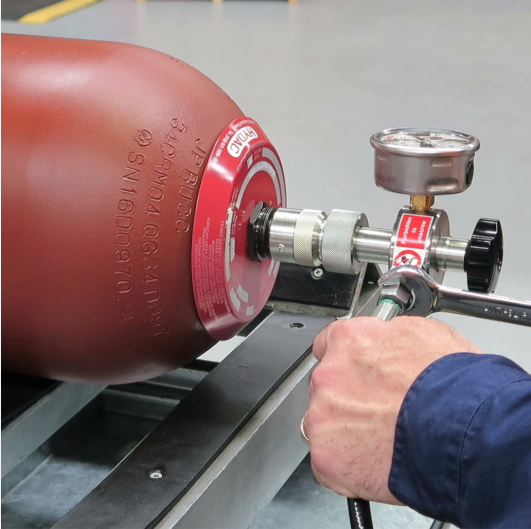The Importance of Professional Servicing for Hydraulic Accumulators

Hydraulic accumulators are vital components of hydraulic systems. They store energy in the form of pressurised fluid and regulate pressure fluctuations. While they’re normally quite robust in their design and construction, they do need regular servicing, and unfortunately, it’s not something a non-trained person should do.
What Are Hydraulic Accumulators?
Hydraulic accumulators come in various types, including bladder, piston, and diaphragm accumulators. Regardless of the type, their primary function is to store hydraulic energy under pressure, which can be released when needed to stabilise a system, provide emergency power, or absorb shock loads.
Due to their role in high-pressure systems, hydraulic accumulators are important in avoiding potentially catastrophic failures. Which is why they need to be serviced by a professional.
Why Professional Servicing is Essential
1. Expert Knowledge and Experience:
Servicing hydraulic accumulators requires an in-depth understanding of their operation, materials, and potential failure points. Professional technicians are trained to diagnose issues accurately and implement appropriate solutions.
2. Compliance with Safety Standards:
Hydraulic accumulators operate under high pressures, posing significant safety risks if mishandled. Professionals adhere to strict safety protocols and industry regulations to ensure safe handling during maintenance.
3. Specialised Tools and Equipment:
Servicing accumulators often requires specialised tools to test pressure levels, inspect seals, and detect leaks. Professionals are equipped with these tools, enabling them to perform precise maintenance tasks.
4. Routine Inspection and Maintenance:
Regular inspections by experts can identify early signs of wear, such as degraded seals or bladder material, ensuring timely repairs before they escalate into costly breakdowns.
5. Prolonged Equipment Lifespan:
Proper maintenance by professionals ensures that accumulators function efficiently, reducing strain on the hydraulic system and extending the lifespan of both the accumulator and associated components.
What a Professional Will Do:
Pressure Testing and Pre-Charge Verification: Maintaining the correct pre-charge pressure, using calibrated gauges to verify and adjust the pressure as needed.
Seal and Component Replacement: Over time, seals, bladders, or diaphragms wear out. Experts can replace these components using OEM parts to maintain performance and compatibility.
Leak Detection and Repair: Even minor leaks can lead to significant energy losses or safety hazards. Professionals use advanced diagnostic tools to locate and fix leaks promptly.
System Integration Checks: Accumulators work in conjunction with other hydraulic components. A professional can assess the entire system, ensuring seamless integration and functionality.
Risks of DIY Servicing
While it may be tempting to cut costs with DIY maintenance, handling hydraulic accumulators without proper training can lead to:
Personal Injury: The high-pressure nature of accumulators can cause serious injuries if mishandled.
Equipment Damage: Incorrect servicing can compromise the integrity of the accumulator or the hydraulic system.
Non-Compliance: Failing to adhere to safety and industry standards can result in fines or operational shutdowns.
Choosing the Right Service Provider
When selecting a service provider for your hydraulic accumulators, consider the following:
Certifications and Training: Ensure technicians are certified and trained in hydraulic system maintenance.
Reputation: Look for a provider with a strong track record of quality service and customer satisfaction, i.e., Google Reviews!
OEM Partnerships: Providers with direct ties to original equipment manufacturers (OEMs) can guarantee access to authentic parts.
Conclusion
Hydraulic accumulators are critical to the efficiency and safety of hydraulic systems. Regular servicing not only prevents failures but also optimises performance and extends equipment life. But please don’t try it if you’re not trained. The potential risks are simply too high.




